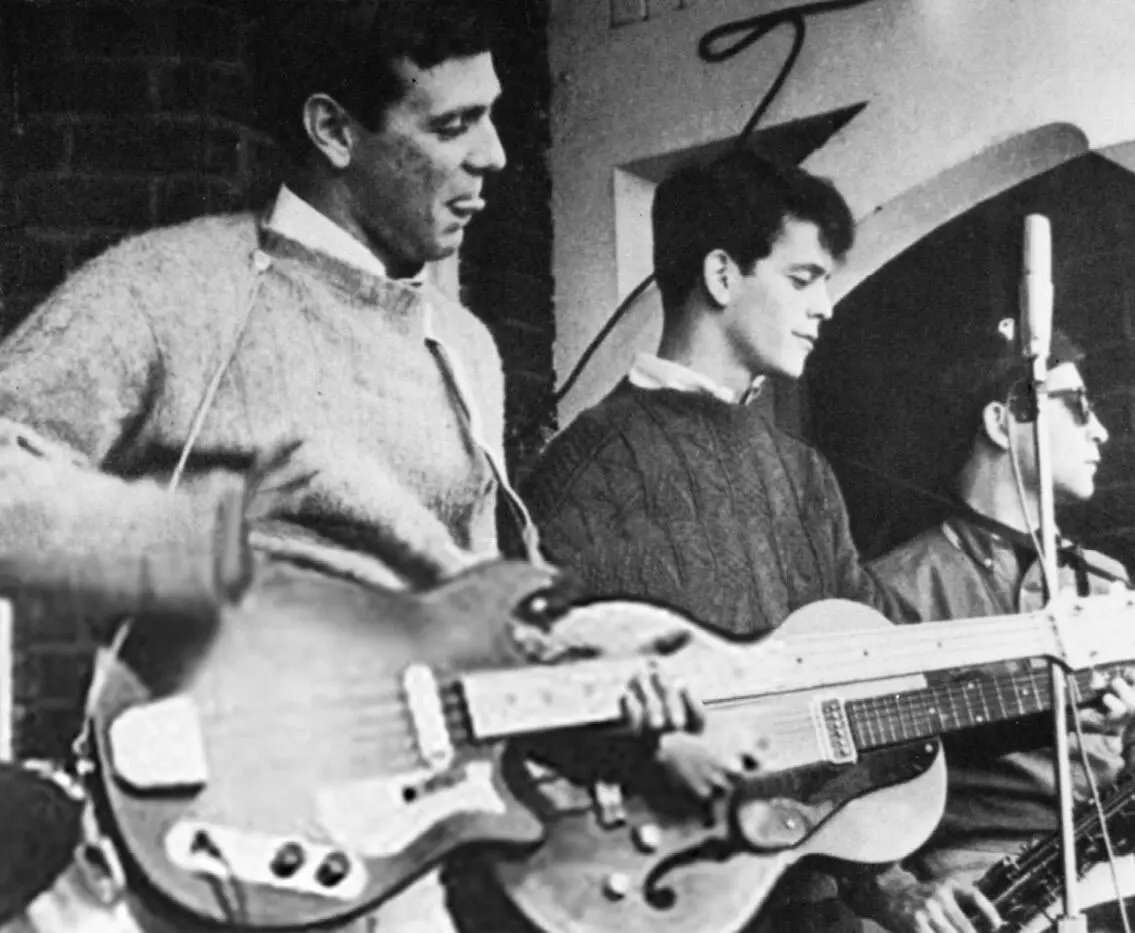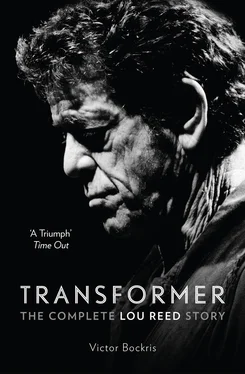Though he was devoting himself to poetry and folk songs, Lou had not dropped his initial ambition to be a rock-and-roll star. In addition to how to direct a play, Lou also learned how to dramatize himself at every opportunity. The showmanship would come in handy when Lou hit the stage with his rock music. Reed’s development of folk music was put in the shade in his sophomore year when he finally formed his first bona fide rock-and-roll band, LA and the Eldorados. LA stood for Lewis and Allen, since Reed and Hyman were the founding members. Lou played rhythm and took the vocals, Allen was on drums, another Sammie, Richard Mishkin, was on piano and bass, and Mishkin brought in Bobby Newman on saxophone. A friend of Lou’s, Stephen Windheim, rounded out the band on lead guitar. They all got along well except for Newman, a loud, obnoxious character from the Bronx who, according to Mishkin, “didn’t give a shit about anyone.” Lou hated Bobby and was greatly relieved when he left school that semester and was replaced by another sax player, Bernie Kroll, whom Lou fondly referred to as “Kroll the troll.”

Reed playing in his Syracuse college band, LA and the Eldorados, with (left) Richard Mishkin. (Victor Bockris)
There was money to be made in the burgeoning Syracuse music scene, and the Eldorados were soon being handled by two students, Donald Schupak, who managed them, and Joe Divoli, who got them local bookings. “I had met Lou when we were freshmen,” Schupak explained. “Maybe because we were friends as freshmen, nothing developed into a problem because he could say, ‘Hey, Schupak, that’s a fucking stupid idea.’ And I’d say, ‘You’re right.’” Soon, under Schupak’s guidance and Reed’s leadership, LA and the Eldorados were working most weekends, playing frat parties, dances, bars, and clubs, making $125 a night, two or three nights a week.
Lou was strongly drawn to the musician’s lifestyle and haunts. Just off campus was the black section of Syracuse, the Fifteenth Ward. There he frequented a dive called the 800 Club, where black musicians and singers performed and jammed together. Lou and his band were accepted there and would occasionally work with some of the singers from a group called the Three Screaming Niggers. “The Three Screaming Niggers were a group of black guys that floated around the upstate campuses,” said Mishkin. “And we would pretend we were them when we got these three black guys to sing. So we would go down there once in a while and play. The people down there always had the attitude, the white man can’t play the blues, and we’d be down playing the blues. Then they’d be nice to us.” The Eldorados also sometimes played with a number of black female backing vocalists.
However, at first what made LA and the Eldorados stick out more than anything else was their car. Mishkin had a 1959 Chrysler New Yorker with gigantic fins, red guitars with flames shooting out of them painted on the side of the car, and “LA and the Eldorados” on the trunk. Simultaneously they all bought vests with gold lamé piping, jeans, boots, and matching shirts. Togged out in lounge-lizard punk and with Mishkin’s gilded chariot to transport them to their shows, the band was a sight when it hit the road. They had the kind of adventures that bond musicians.
Mishkin remembered, “One time we played Colgate and we were driving back in Allen’s Cadillac in the middle of a snowstorm, which eventually stopped us dead. So we’re sitting in the car smoking pot around 1 a.m., and we realized that we can’t do that all night because we’d die. The snow was deep, so we got out of the car and schlepped to this tiny town maybe half a mile away. We needed a place to stay so we went to the local hotel, which was, of course, full. But they had a bar there. Schupak was in the bar telling these stories about how he was in the army in the war, and Lewis and I are hysterical, we are dying it was so funny. Then the bartender said, ‘You can’t stay here, I have to close the bar.’ We ended up going to the courthouse and sleeping in jail.”
The Eldorados further distinguished themselves by mixing some of Lou’s original material into their set of standard Chuck Berry covers. One of Lou’s songs they played a lot was a love song he wrote for Shelley, an early draft of “Coney Island Baby.” “We did a thing called ‘Fuck Around Blues,’” Mishkin recalled. “It was an insult song. It sometimes went over well and it sometimes got us thrown out of fraternity parties.”
LA and the Eldorados played a big part in Lou’s life, providing him with many basic rock experiences, but he kept the band separate from the rest of his life at Syracuse. At first Lou wanted to make a point of being a writer more than a rock-and-roller. In those days, before the Beatles arrived, the term rock-and-roller was something of a put-down associated more with Paul Anka and Pat Boone than the Rolling Stones. Lou preferred to be associated with writers like Jack Kerouac. This dichotomy was spelled out in his limited wardrobe. Like the classic beatnik, Lou usually wore black jeans and T-shirts or turtlenecks, but he also kept a tweed jacket with elbow patches in his closet in case he wanted to come on like John Updike. However, in either role—as rocker or writer—Lou appeared somewhat uncomfortable. Therefore, in each role he used confrontation as a means both to achieve an effect and dramatize an inner turmoil that was quite real. For Hyman and others, this sometimes made working with Lou exceedingly difficult.
According to Allen, “One of the biggest problems we had was that if Lou woke up on the day of the job and he decided he didn’t want to be there, he wouldn’t come. We’d be all set up and looking for him. I remember one fraternity party, it was an afternoon job, we were all set up and ready to go and he just wasn’t there. I ran down to his room and walked through about four hundred pounds of his favorite pistachio nuts, and then I found him in bed under about six hundred pounds of pistachio nuts—in the middle of the afternoon. I looked at him and said, ‘What are you doing? We have a job!’ And he said, ‘Fuck you, get out of here. I don’t want to work today.’ I said, ‘You can’t do this, we’re getting paid!’ Mishkin and I physically dragged him up to the show. Ultimately he did play, but he was very pissed off.”
Reed seemed to at once want the spotlight and to hate it.
“Lou’s uniqueness and stubbornness made him really different than anyone I had ever known,” added Mishkin. “He was a terrible guy to work with. He was impossible. He was always late, he would always find fault with everything that the people who had hired us expected of us. And we were always dragging him here and dragging him there. Sometimes we were called Pasha and the Prophets because Lou was such a son of a bitch at so many gigs he’d upset everyone so much we couldn’t get a gig in those places again. He was as ornery as you can get. People wouldn’t let us back because he was so absolutely rude to people and just so mean and unappreciative of the fact that these people were paying us to get up and play music for them. He couldn’t have cared less. So we used the name Pasha and the Prophets in order to play there again. And then the people who hired us were so drunk they wouldn’t remember. He would never dress or act in a way so that people would accept him. He would often act in a confrontational manner. He wanted to be different.
“But Lou was ambitious. He wanted to be—and said this to me in no uncertain terms—a rock-and-roll star and a writer.”
Читать дальше













